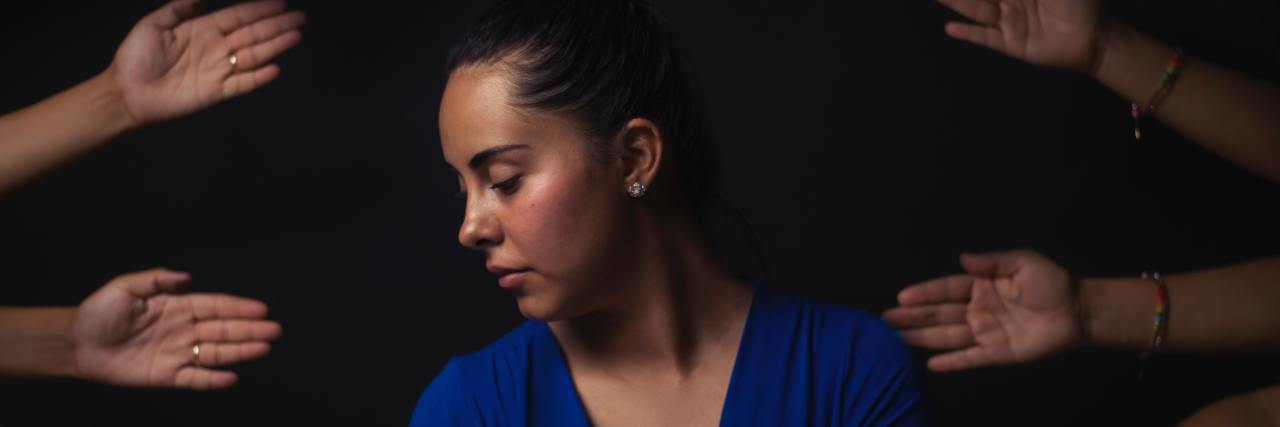Why Social Distancing Helped My PTSD and Why I Dread Its End
Editor's Note
If you’ve experienced domestic violence or emotional abuse, sexual abuse or assault, the following post could be potentially triggering.
You can contact The National Sexual Assault Telephone Hotline at 1-800-656-4673.
You can contact The National Domestic Violence Hotline online by selecting “chat now” or calling 1-800-799-7233.
You can also contact the Crisis Text Line by texting “START” to 741741.
Now that we’re starting to get this pandemic a bit under control in our country and vaccines have shown up on the scene, a lot of the COVID-19 restrictions that we all have grown accustomed to are ending. Most recently, the CDC lifted the mask mandate in most situations for fully vaccinated citizens. My state’s governor just announced in a matter of days previously that in place restrictions are ending, including social distancing. I’m glad to see that maybe things are getting better and life goes on, but I’m honestly dreading the impact of some of these changes on my mental health.
Particularly, my post-traumatic stress disorder (PTSD) really appreciated the social distancing. It offered me much-needed space from strangers and I could breathe just a bit easier not being crowded in a line.
Hypervigilance, a common symptom of PTSD, means I scan crowds all around me, including being incredibly aware of what is behind me, which is the hardest part. I have had moments where I was nearly convinced some random guy was stalking me because he continued to follow me to other aisles purely out of coincidence. Logic told me we both need breakfast cereal, but my PTSD counts all the times I’ve had to gradually glance over my shoulder and saw him there. My heart races, my breath becomes labored and I suddenly feel my legs about to break out in an instant sprint out of the store. Therapy has taught me how to rationalize and assess whether I experienced a genuine threat or I was just triggered, but social distancing gave less opportunity where this happened. Actually, I know how many times: once. I grabbed the oatmeal; the stranger chose Cap-n-Crunch.
It isn’t just the need for actual space; it was the fact I didn’t get taken into unexpected embraces by often well-meaning individuals without my permission. Physical touch physically hurts me due to chronic pain, but emotionally and mentally it can send me spiraling in a completely different hurtful way. I have to stand there, order myself to “deal with it” and put a smile on my face because speaking up and saying “please don’t hug me” is so terrifying that I can’t make my lips move to make the words leave my mouth. I shrink to try and avoid being touched as much as possible once engulfing arms are sucking the air from me. Watching people hesitate and pull back from embracing me after realizing the pandemic restrictions allowed me the ability to decide whether, if the rules lapsed, I would want to be hugged by them. It provided invaluable time to evaluate for future opportunities. For what it’s worth, I decided that I do want to be hugged by these individuals when things get back to “normal.”
When there were rules in place, yes, I hated them. At first, especially, they were overwhelming, but over time I adjusted and found them to be a semblance of structure. They offered a bit of predictability that allowed me to practice putting down my guard with everything from leaving my home to even going out on a date.
The restrictions showed me that people can communicate and ask for consent at respecting each other’s autonomy. That they do know how not to cross lines that are clearly there, which in return allowed me to put boundaries down.
If I’m honest, I’m not looking forward to shaking hands again or unexpected embraces — you know, the things society has normalized. I don’t like those things, I never have. I can feel myself gearing up to fight triggers left and right, putting on another suit of armor just to interact with people. I take comfort in the tools I’ve learned in therapy, my improving ability to communicate with others, the knowledge I don’t have to “just deal” with anyone or anything that makes me uncomfortable, PTSD trigger or gut instinct. I also am thankful for my support system and how they respected me with or without a pandemic.
My hope is that people take away that moment of hesitancy that they learned from this pandemic before acting without permission from another and apply it to consent even with the simplest of things. If you followed the rules because we were told to safeguard each other’s health, continue to do so because it’s the right thing to do with or without a pandemic involved.
I look forward to soon hugging all of you… Just as soon as we both agree it’s not a standing restriction anymore.
Photo by Cristian Newman on Unsplash

